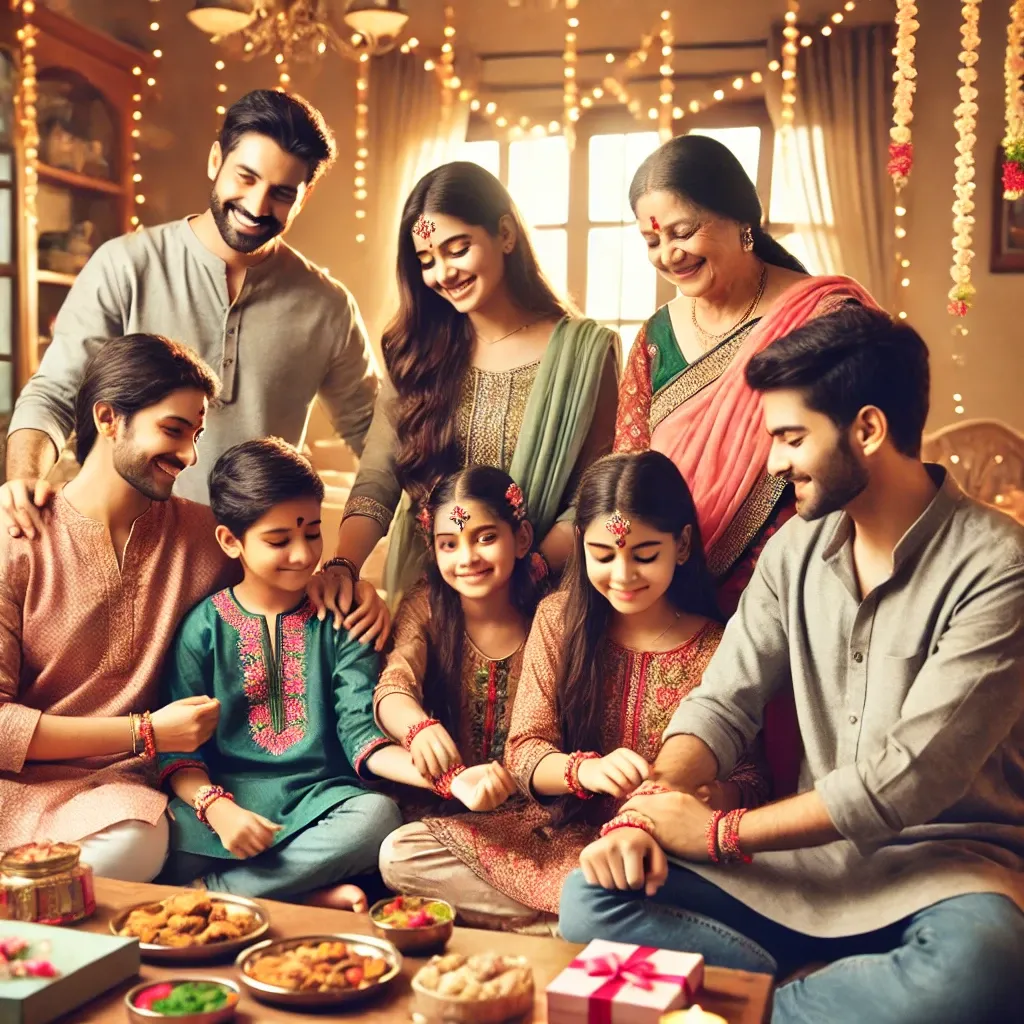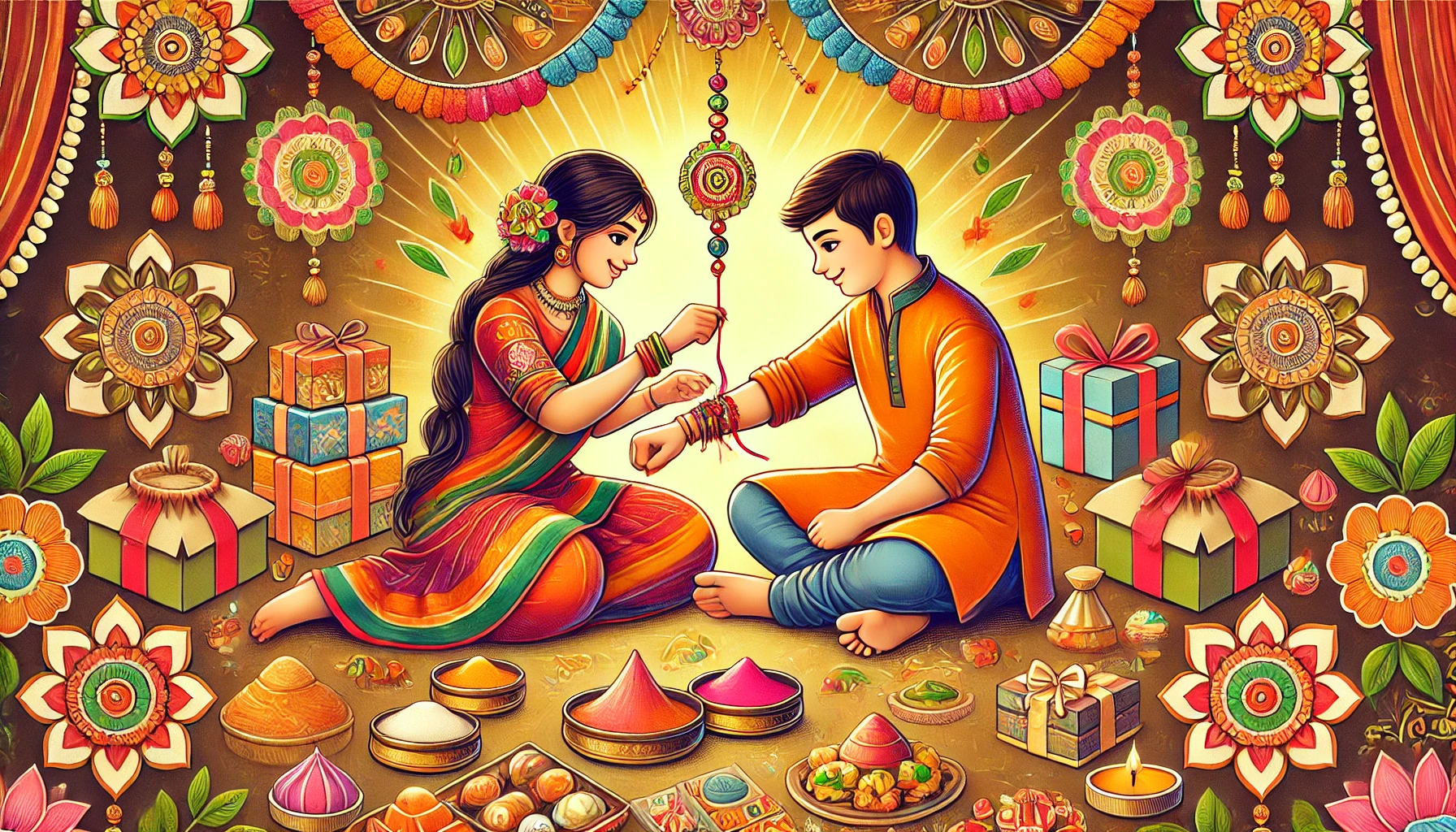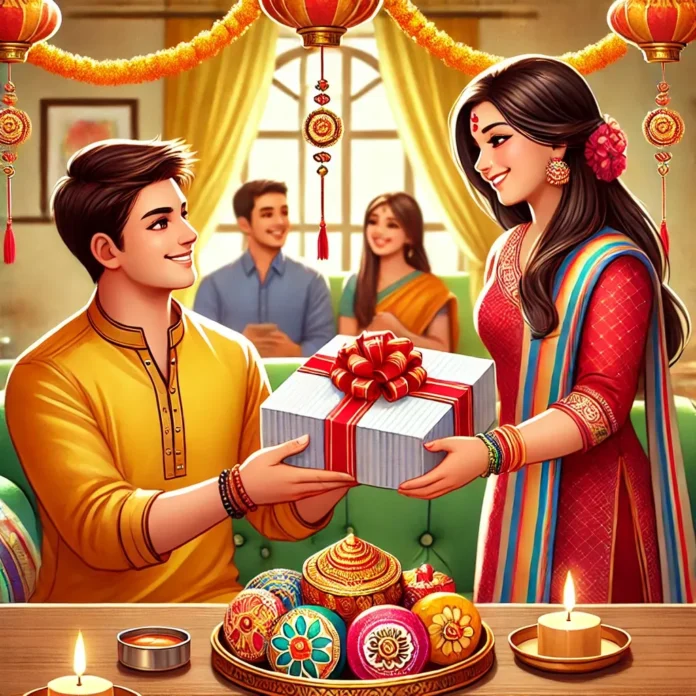Rakshabandhan, also known as Rakhi, is a beautiful festival celebrated to strengthen the brother-sister relationship. In Indian culture, it is a big event. It’s all about expressing love, care, protection, and the warmth the siblings share.
Rakshabandhan Traditions and Customs
One of the central rituals of Rakshabandhan is the tying of Rakhi. Sisters perform aarti while those who are supposed to be tied on hand should sit facing east. They apply tilak on their brothers’ foreheads and tie the Rakhi amidst chanting prayers. On the other hand, brothers take a pledge for the same and vice versa. Thereafter, brothers pray for their sisters and take a pledge to protect them in whatever situation the sister goes through.
Another inherent part of Rakshabandhan is the exchange of gifts. Traditional presents include sweet delicacies like laddoos and barfis, while modern trends include a variety of items, from personalized items to gadgets and fashion accessories.

Rakhi Gifts: Meaningful Gestures
Gift exchange forms an important part of the Rakshabandhan festival and has great emotional value. It symbolizes the lovely brother-sister relationship that shares a bond of love. Sisters select gifts thoughtfully based on their brothers’ choice and character, while brothers try to give meaningful gifts to express love and gratitude.
Some popular rakhi gift ideas are:
- Chocolate hamper box
- Bath and body gift box
- Shopping gift voucher
- Perfume
- Makeup kit
- Stylish bag
- Subscription pack
The Brother-Sister Bond: Celebrating Love and Protection
The very beautiful brother-sister relationship is at the very core of Rakshabandhan. The thread of Rakhi signifies, through her prayers, the sister’s emotions and wishes for the brother’s safety and well-being, and the brother pledges to safeguard his sister’s interests and life throughout. Stories from mythology and legends have been highlighted as examples of this special bond, where brothers went to every extent to safeguard the interests of their sisters.
Rakshabandhan Joyous Celebrations All Across India
Beginning with the freeness of spirit, the rakhi festival is celebrated very prominently all over India; however, its customs and rituals differ from region to region. In the northern parts of India, rakhi tying is followed by family reunions and relishes in traditional sweets. In Rajasthan and Gujarat, colours are added to Rakshabandhan by holding fairs where all types of rakhis are sold. Everything would be available, from simple threads to exquisitely designed ones.
Modern Trends: Rakshabandhan in the Digital Age
It has also helped in bridging the geographical gaps between siblings when it came to the celebration of Rakshabandhan. Since virtual Rakhi tying through video calls was the current trend, even those siblings physically separated from each other could celebrate this festival together. Social media is filled with Rakshabandhan wishes, pictures of Rakhi celebrations, and emotional messages between siblings.
Rakshabandhan Beyond Boundaries – Global Celebrations
Beyond the borders of India, Rakshabandhan has reached almost all countries and has gained recognition in various parts of the world. Indian diaspora celebrates Rakshabandhan with equal enthusiasm and reverence, trying to adapt its custom to suit their cultural ambience. Observance with community events, cultural programmes, and exchange of Rakhis amongst friends and colleagues mark Rakshabandhan in countries like the United States, United Kingdom, Canada, and Australia.

Cultural Significance of Raksha Bandhan
Rakshabandhan holds great cultural significance in India because it personifies the relationship of protection and love between siblings. It’s a festival that strengthens family bonds and commemorates the unique relationship between sisters and brothers. The rituals and traditions associated with Raksha Bandhan reflect an aspect of duty, responsibility, and mutual respect within the family unit.
Tying Rakhi, or the sacred thread, to the brother’s wrist is a gesture symbolic of her love and prayers for his welfare. The sister ties Rakhi, or the holy thread, around the wrist of her brother, which symbolizes her love and prayers for his good health and prosperity. Then, the brother pledges to protect and care for his sister in all situations of her life. This ritual strengthens not only the bonding between siblings but also looks forward to mutual care and protection explicitly within the family structure.
The festival has its roots in Indian mythology and history. It’s said that once, when Lord Krishna got an injury on his wrist during the course of his war with the wicked king Shishupal, Draupadi immediately tore off a piece of her sari and tied it around his wrist to stop the bleeding. This impressed Lord Krishna, and he declared that he would repay this debt in another birth. This incident set the precedence of Rakhi tying, where sisters tie a pure thread called Rakhi around their brothers’ wrists as a symbol of their love and prayers for their well-being.
Historical Origins of Raksha Bandhan
The Rakshabandhan festival has its historical roots in the ancient Indian scriptures and legends. One such legend that became famous is of Queen Karnavati of Chittor, who sent a Rakhi to Emperor Humayun of Delhi to seek his help in protecting her kingdom from the invading forces. Moved by the gesture, he immediately rode towards her to help protect her kingdom—a superlative example of Raksha Bandhan.
Gradually, Raksha Bandhan has become the festival of sibling relationship and more about protection and solidarity with one another. Basically, this projects the unity and togetherness in blood relations so deeply inculcated into the Indian cultural system.
Symbolism Behind Raksha Bandhan
The Rakhi thread itself is significant in the celebration of Raksha Bandhan. It is symbolic of a woman’s love, prayers, and good wishes for her brother’s well-being and prosperity. The thread has also emerged as a symbol of assurance and security given by the brother to his sister during her times of need and as a protector and supporter.
Other customs such as putting tilak on the brother’s forehead, sharing sweets and giving presents add to the list of symbols. This bundle of practices strengthens emotional bonding between brother and sister. It makes them feel a part of the family.
Gender Roles and Raksha Bandhan
Traditionally, Raksha Bandhan has been celebrated between sisters and brothers, reflecting specific gender roles within Indian society. This festival reinforces the brother’s role as protector and sister’s as nurturer, highlighting complementary roles they play in a family.
Much more in the modern period, people have been aware and accepting of diversified family structures and relationships. Though Raksha Bandhan still remains primarily a celebration of sibling bonding, it is also slowly adapting to changing gender roles and family structures. Nowadays, many people celebrate Raksha Bandhan with cousins, close friends, or even as a gesture of symbolic brotherhood or sisterhood with friends, showing mutual respect toward one another.
Why Between Sisters and Brothers Only?
The reason Raksha Bandhan is only celebrated between siblings lies in the cultural and family traditions underlined by sibling relationships that are inviolate. This is a celebration of the exclusive bond between siblings, which has elements of love, support, and companionship going on to last a lifetime.
This fact itself of exclusivity reflects the importance of family bonding and siblings’ bonding with each other in each other’s lives. Raksha Bandhan festival offers an opportunity to express one’s sentiments of affection and gratitude towards each other, strengthening the bond and creating sweet memories.
Raksha Bandhan Beyond India
Although Raksha Bandhan is mainly observed in India, the festival has gained much global significance. The Indian communities and diaspora across the world celebrate Raksha Bandhan with great zest, adding shades of their cultures into its traditions and practices.
Beginning in Nepal, Mauritius, and parts of Southeast Asia with large Indian populations, Raksha Bandhan is celebrated with much traditional pomp and fanfare. It is a cultural bridge that binds people across different countries and continents for those of Indian origin, under the umbrella of values of family unity and solidarity.
Different States—Different Rakhi Traditions and Rituals
In fact, the way the Raksha Bandhan festival is celebrated varies all over India, each one giving the festival a different flavour. The function of Rakhi tying is quite an extensive one in states like Rajasthan and Gujarat, accompanied by traditional prayers and offerings. In many other places, the sisters will perform aarti and apply tilak on their brothers’ foreheads before proceeding to tie the Rakhi.
The design and the raw material used for Rakhis are also decided by regional variations. Ranging from a simple thread to an intricately designed bracelet with beads, pearls, and embellishments, the Rakhis reflect the cultural diversity and finesse of the artistic craftsmanship of different regions.
The different customs and traditions followed while celebrating Raksha Bandhan reflect India’s rich cultural diversity. In fact, it would be proper to say that every state and region of India celebrates this festival in its own way, which makes the celebration of Raksha Bandhan all the more kaleidoscopic.
In the states of Rajasthan and Gujarat, there is great fanfare as the sisters tie Rakhi on brothers’ wrists amidst traditional music and rituals. In Maharashtra, special dishes called “kheer-puri” are prepared by the sisters as an offering to their brothers during Raksha Bandhan. Similarly, in Punjab, the festival of Raksha Bandhan merges with the festival of Rakhi, where the sisters tie Rakhi on the right hand wrist.
Impact of Raksha Bandhan on Family Dynamics
Raksha Bandhan is, therefore, the festival that strongly binds relationships within the family. It inspires siblings to express their love and thankfulness toward each other, thus infusing the very element of being united and together into the family unit.
It is also a part of the rituals and customs of Raksha Bandhan to show mutual respect and support for sibling relationships. The exchanging of Rakhis and gifts is a way to proclaim their duties to each other and be by each other’s side through thick and thin.
Conclusion
Raksha Bandhan, therefore, is a festival that expresses brother-sister relationships through customs, rituals, and cultural practices developed over several hundred years. Raksha Bandhan is important not only for the symbolic rituals but also for the emotional connect it brings between family members.


